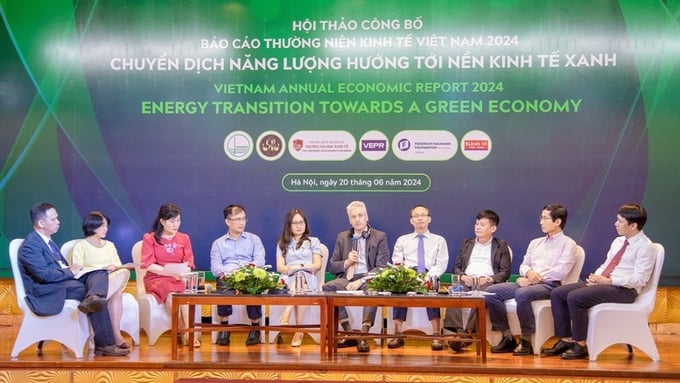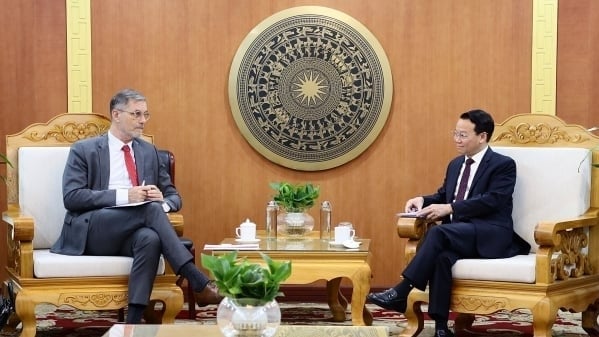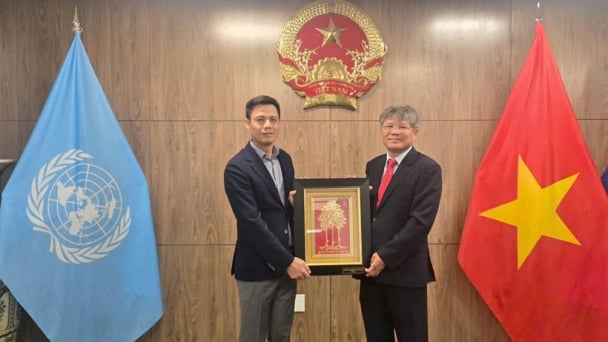May 22, 2025 | 03:49 GMT +7
May 22, 2025 | 03:49 GMT +7
Hotline: 0913.378.918
May 22, 2025 | 03:49 GMT +7
Hotline: 0913.378.918

Workshop to announce Vietnam Annual Economic Report 2024 with the theme "Energy transition towards a green economy".
On June 20, in Hanoi, a workshop to announce the Vietnam Annual Economic Report 2024 took place with the theme "Energy Transition Towards a Green Economy". The workshop was organized by the Vietnam Institute for Economic and Policy Research (VEPR) under the University of Economics - Vietnam National University, Hanoi (VNU), in collaboration with the Friedrich Naumann Foundation (FNF) Vietnam.
Vietnam Annual Economic Report is a product of the Vietnam Institute for Economic and Policy Research (VEPR), affiliated with the University of Economics - Vietnam National University, Hanoi (VNU), and has continuously published and published over the past 16 years, focusing on analyzing Independently and objectively analyze achievements, difficulties, opportunities and challenges in the development process, contribute to providing a scientific basis for macroeconomic policymaking, and discuss in-depth economic issues of Vietnam.
Vietnam Annual Economic Report 2024, with the theme "Energy Transition Towards a Green Economy," has given an overview of Vietnam's economy in 2023 and nearly the first half of 2024 on economic growth, inflation, currency, and credit markets, finance, labor and energy; assess the relationship between renewable energy transition and economic development; Research international experiences in countries such as the UK, Germany, and China on renewable energy transition and propose solutions to promote renewable energy transition in Vietnam...
Associate Professor, PhD. Nguyen Truc Le, Chairman of the Council of the University of Economics, Vietnam National University, Hanoi, said that green transformation is a practical requirement and trend of the times, of global stature, and is increasingly becoming a top priority. Vietnam is at the forefront of the integration journey towards sustainable and comprehensive development.
As one of the Asian countries with the most significant ambitions at COP 26, Vietnam's net zero emissions strategy commits to reducing emissions by 43.5% by 2030.
"Increasing pressure from strict environmental regulations of developed countries is urging the Government as well as Vietnamese businesses to participate more quickly and firmly in the energy transition towards greening the economy.
This is both a challenge and an opportunity for countries like Vietnam to promote sustainable economic restructuring, improve competitiveness, and take advantage of trade and investment cooperation new opportunities", Associate Professor Dr. Nguyen Truc Le commented.
At the workshop, Associate Professor, PhD. Nguyen Anh Thu, Vice-Rector of the University of Economics - Vietnam National University, Hanoi, provided assessments to suggest important policy recommendations.
Specifically, in the short term, to achieve the economic growth target of 6-6.5% in 2024, it is necessary to continue to prioritize the financial tools of fiscal policy to promote aggregate demand, Enhance disbursement of public investment to ensure on-schedule and focus, significant infrastructure projects.
Because domestic consumption motivation is still weak, it is necessary to continue reducing VAT in 2024 and consider expanding the scope of application. Have more specific consumer stimulation programs and policies, and need to go in the direction of directly supporting consumers to pay for the purchase of products/services, especially to orient consumption according to consumer trends of green, clean, and environmental protection, contributing to the Net Zero commitment by 2050.
There must be more credit packages for businesses to invest in sustainable, carbon-neutral production. The government needs to announce a green classification list soon so qualified businesses can easily access domestic and foreign sources of green credit.
Add more capital to credit guarantee funds in localities and increase unsecured loans for small and medium enterprises. Promote the implementation of credit ratings for small and medium-sized enterprises to serve as a basis for funds to provide credit guarantees.
Besides, ensuring harmony and efficiency in the goal of credit growth to support production and business for businesses in particular, promote consumption and restore growth in general. Promote diversification of capital and investment channels other than bank credit (improve efficiency and transparency of stock and bond markets, other capital channels associated with green credit, public energy transition license, financial lease...).
In the medium and long term, it is necessary to perfect the national digital transformation strategy, promoting factors that create real added value in the digital economy, such as software technology, platform business, and e-commerce, to motivate innovation. Arrange resources to promote the development of growth models and restructure the economy.
To support businesses, according to Associate Professor, PhD. Nguyen Anh Thu, it is necessary to prioritize policies and reforms to remove difficulties, reduce the burden on businesses, and build trust in the investment environment to encourage businesses to return to the market and expand their scale. Special support policies for businesses must be specific and feasible (export support policies are quite successful). Overall policies aim to improve labor productivity and competitiveness of industries and businesses in the long term.
Translated by Huong Giang

(VAN) On May 21, Minister of Agriculture and Environment Do Duc Duy worked with Mr. Olivier Brochet, Ambassador Extraordinary and Plenipotentiary of the French Republic to Vietnam.

(VAN) VRG recently conducted a visit and working trip to the United States to demonstrate its efforts in redefining the role of rubber enterprises in the global value chain.

(VAN) In 2024, over 295 million people across 53 countries and territories faced acute hunger—an increase of almost 14 million people compared to 2023, while the number of people facing catastrophic levels of hunger reached a record high.

(VAN) World Environment Day 2025 (June 5) carries the theme 'Beat Plastic Pollution' continuing to emphasize the global urgency of addressing the plastic waste crisis.

(VAN) This was the assessment shared by experts at the workshop titled 'Assessing the Role and Potential of Low-Emission Rice Production Systems in Vietnam,' held on the morning of May 19.

(VAN) Cai Rong Port is the fisheries control center of Quang Ninh, helping to monitor fishing vessels, combat IUU fishing, and remove the EC's 'yellow card'.

(VAN) The German Agricultural Society (DLG) explores the possibility of establishing a mechanization service center in Vietnam’s Mekong Delta to support farmers in accessing and utilizing advanced machinery.